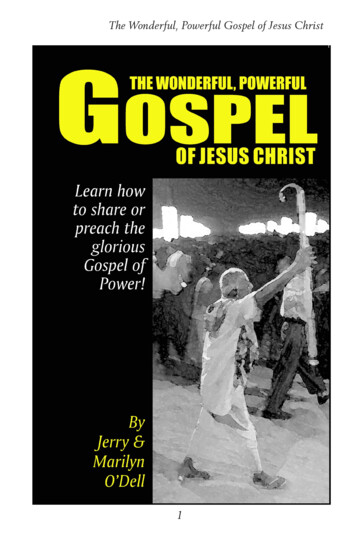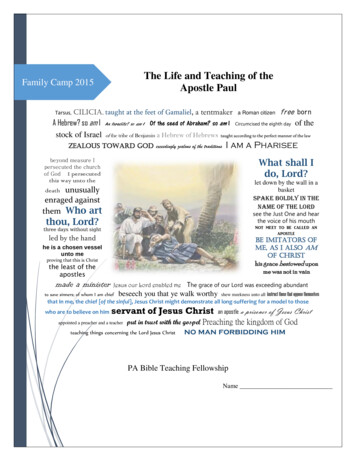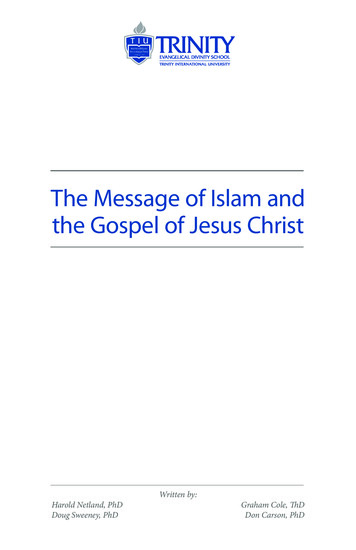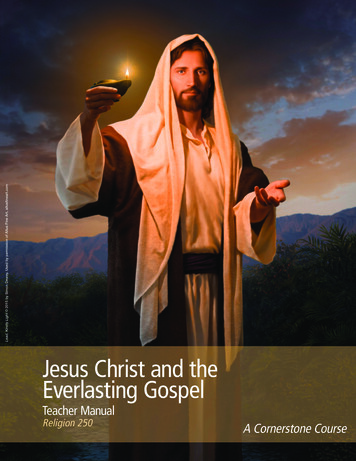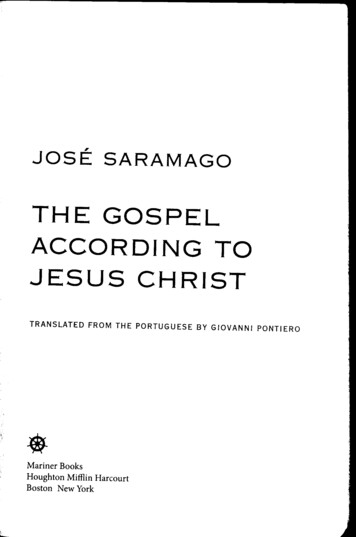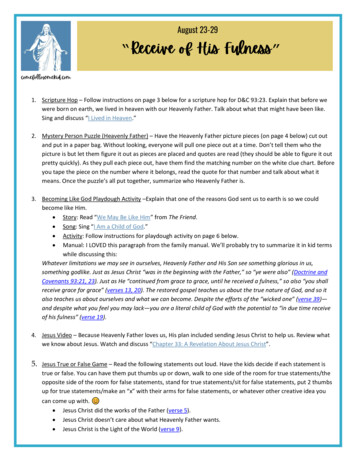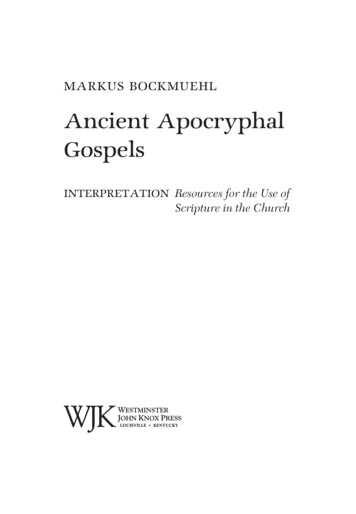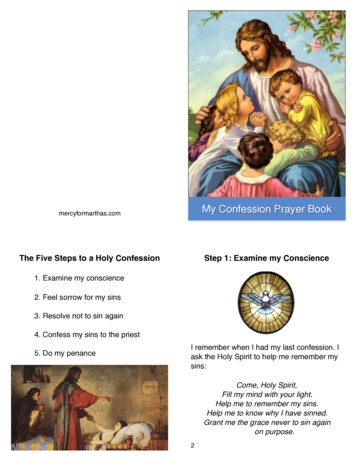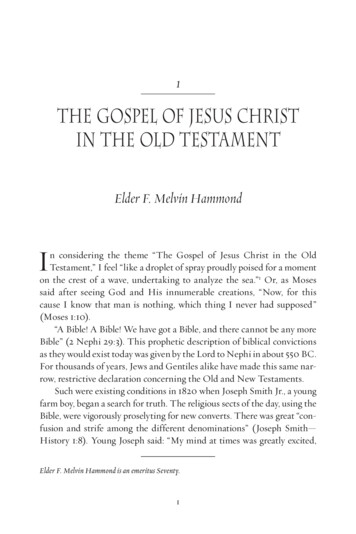
Transcription
1The Gospel of Jesus Christin the Old TestamentElder F. Melvin HammondIn considering the theme “The Gospel of Jesus Christ in the OldTestament,” I feel “like a droplet of spray proudly poised for a momenton the crest of a wave, undertaking to analyze the sea.”1 Or, as Mosessaid after seeing God and His innumerable creations, “Now, for thiscause I know that man is nothing, which thing I never had supposed”(Moses 1:10).“A Bible! A Bible! We have got a Bible, and there cannot be any moreBible” (2 Nephi 29:3). This prophetic description of biblical convictionsas they would exist today was given by the Lord to Nephi in about 550 BC.For thousands of years, Jews and Gentiles alike have made this same narrow, restrictive declaration concerning the Old and New Testaments.Such were existing conditions in 1820 when Joseph Smith Jr., a youngfarm boy, began a search for truth. The religious sects of the day, using theBible, were vigorously proselyting for new converts. There was great “confusion and strife among the different denominations” (Joseph Smith—History 1:8). Young Joseph said: “My mind at times was greatly excited,Elder F. Melvin Hammond is an emeritus Seventy.1
2Elder F. Melvin Hammondthe cry and tumult were so great and incessant. The Presbyterians weremost decided against the Baptists and Methodists, and used all the powers of both reason and sophistry to prove their errors, or, at least, to makethe people think they were in error. On the other hand, the Baptists andMethodists in their turn were equally zealous in endeavoring to establishtheir own tenets and disprove all others” (Joseph Smith—History 1:9).Lamenting the apparent differences between the local religiousleaders, Joseph said, “The teachers of religion of the different sects understood the same passages of scripture so differently as to destroy allconfidence in settling the question by an appeal to the Bible” (JosephSmith—History 1:12). In his confusion, he turned to the admonition ofJames in the New Testament: “If any of you lack wisdom, let him ask ofGod, that giveth to all men liberally, and upbraided not; and it shall begiven him” (James 1:5). With innocence and pure faith, the boy followedthe admonition and appealed in secret prayer to the only perfect sourceof truth, his Heavenly Father. Then in a moment unique in all of history,God the Father and His Beloved Son, Jesus Christ, appeared in glory toJoseph Smith. From that moment on, knowledge and understanding began to cover the earth and illuminate the minds of men.Praise be to God for a modern-day prophet! Were it not for JosephSmith, we would still be mired down in the black tar of ignorance,“ever learning, and never able to come to the knowledge of the truth”(2 Timothy 3:7). Until Joseph Smith came on the scene, no one had understood many of the truths found in the Old Testament for over a thousand years.The Jews still conformed to the Mosaic covenant, completely unaware that Israel had broken the “everlasting covenant” (Isaiah 24:5).Christianity’s use of the Old Testament had been relegated to a carefullyselected menu of character-building stories. As light and knowledge burstforth, the old Mosaic covenant was replaced with the new and everlasting covenant! The everlasting covenant given anew in every dispensationwas appropriately called the new and everlasting covenant in this, the lastdispensation.Clearly the world had misinterpreted, misconstrued, and misunderstood the divine message of the Bible, namely that Jehovah was noneother than Jesus Christ, the Son of the Everlasting Father; that the gospel
The Gospel of Jesus Christ in the Old Testament3of salvation was given in the beginning to Adam and Eve and was everlasting; and that all the prophets had declared these same eternal truths.The remarkable visit of the Father and the Son to Joseph in 1820 wasonly the prelude to many extraordinary events that gradually led to a further understanding of truth restored to the earth. The following eventsin the life of Joseph Smith will lead us to a better grasp of our theme, thegospel of Jesus Christ in the Old Testament.1. In 1823, three years after the glorious visitation of God theFather and His Beloved Son, Jesus Christ, to the boy JosephSmith Jr., an angel calling himself Moroni made an appearance to Joseph and informed him of golden plates that wereburied in a hill not far from his home. He was told that, using an instrument called the Urim and Thummim, he was totranslate the writings engraved on the plates. The plates contained a sacred record of an ancient people who had inhabitedthe American continent. Joseph was told that after visitingthe site every year for four years he was to obtain possessionof the plates and commence an interpretation.2. On September 22, 1827, the plates were obtained by Joseph,and by the spring of 1829, the translation was completed.Although there were many impediments to the printing, thework continued and in the early spring of 1830, the first editions of the Book of Mormon were ready for distribution.3. During his work on the Book of Mormon, Joseph Smith wascommanded to commence a translation of the Bible relyingon revelation. In June of 1830, with Oliver Cowdery acting asscribe, the work began in earnest. He started with the bookof Genesis. It is interesting to note that the Prophet was onlytwenty-four years old and Oliver but twenty-three years oldat the time.It seems important at this point to emphasize the respect that Josephhad for the Bible—both the Old and New Testaments. He said that thosewho read the Bible can “see God’s own handwriting in the sacred volume:and he who reads it oftenest will like it best, and he who is acquaintedwith it, will know the hand [of God] wherever he can see it.”2 However, he
4Elder F. Melvin Hammondrecognized that there were many omissions and “many plain and preciousthings” had been lost. Said he, “I believe the Bible as it read when it camefrom the pen of the original writers. Ignorant translators, careless transcribers, or designing and corrupt priests have committed many errors.”3As the Prophet Joseph Smith began to translate the Bible, truths solong hidden from the world came to light. Keys to understanding thescriptures were revealed. The gospel of Jesus Christ, with the priesthoodand all the ordinances necessary for salvation, had been given to manfrom the beginning. Suddenly, the Creation of the earth, the Fall of man,the Atonement of Jesus Christ, and the holy priesthood all began to makesense. And the new knowledge gave a clear pattern to follow in order toobtain eternal life.Adam, Enoch, Abraham, Isaiah, and others have become heroes inmy eyes. There was great purpose in their lives. I see them as real people—yet spiritual giants—prophesying, performing miracles, strugglingto bless their people, defending the truth, and preaching the gospel ofJesus Christ.A dam and EveAdam and Eve were cast out of the Garden of Eden because theytransgressed a law given to them by God. They ate the forbidden fruitof the tree of knowledge of good and evil and in so doing became mortal—knowing good from evil, enduring pain (physical and emotional),having natural feelings of sadness and happiness, and being subject toSatan’s temptations. Children were born to them. In their need, Adamand Eve called out to the Lord and heard His voice, “and they saw himnot; for they were shut out from his presence” (Moses 5:4). They werecommanded to worship the Lord their God and make a sacrificial offering of a firstborn lamb from their flock. “And Adam was obedient untothe commandments of the Lord” (Moses 5:5).After many days, an angel of the Lord appeared to Adam and Eve andtaught them the purpose for sacrifice, saying, “This thing is a similitude ofthe sacrifice of the Only Begotten of the Father, which is full of grace andtruth” (Moses 5:7). The angel further taught them that they should do allthings in the name of the Son, that they should repent, and that they shouldcall upon God in the name of the Son forevermore. The Holy Ghost fell
The Gospel of Jesus Christ in the Old Testament5upon Adam and taught him that even though “thou hast fallen thou mayestbe redeemed, and all mankind, even as many as will” (Moses 5:9).Can you imagine the joy they felt as the gospel was given to them? Isthere any way to express the happiness that entered into their hearts? Theyresponded to their newfound knowledge just as any of us would: “theymade all things known unto their sons and their daughters” (Moses 5:12).But some of their children did not accept the truth, and the scripturesadly states that “they loved Satan more than God” (Moses 5:13). Still, theplan of happiness was in place—Jesus Christ was the Redeemer, and allmen could be redeemed through obedience to the laws and ordinances Heprescribed, including baptism and receiving the gift of the Holy Ghost.No one is nor can be exempt from these basic ordinances; henceAdam “was caught away by the Spirit of the Lord, and was carried downinto the water, and was laid under the water, and was brought forth outof the water. And thus he was baptized, and the Spirit of God descendedupon him, and thus he was born of the Spirit, and became quickened inthe inner man. And he heard a voice out of heaven, saying: Thou art baptized with fire, and with the Holy Ghost” (Moses 6:64–66).Adam lived to be 930 years old. He preached the plan of salvationto his children and grandchildren. As has been stated, some rejected theword of their first father; others listened, believed, and acted on his teachings. Abel, Seth, Enos, Cainan, Mahalaleel, Jared, and Enoch—one righteous son after another came forth, “and they were preachers of righteousness, and spake and prophesied, and called upon all men, everywhere, torepent; and faith was taught unto the children of men” (Moses 6:23).The prophet Daniel in the Old Testament refers to Adam as theAncient of Days (see Daniel 7:9). We know him as Michael, who helpedJehovah form the earth and is the mortal father of all men. The ProphetJoseph Smith declared, “He (Adam) is the father of the human family,and presides over the spirits of all men.”4 Further Joseph stated, “Christ isthe Great High Priest; Adam next.”5EnochEnoch, the seventh patriarch from Adam, is another of my scripturalheroes. He is hardly mentioned in the Old Testament. After the “begats”and “all the days of,” we read, “And Enoch walked with God: and he was
6Elder F. Melvin Hammondnot; for God took him” (Genesis 5:24). We shall look further at this scripture in a moment, for it has a thrilling ending. Enoch was well acquaintedwith Father Adam. According to the order of the priesthood, which camethrough Adam to his sons and grandsons, “Enoch was twenty-five yearsold when he was ordained under the hand of Adam; and he was sixty-fiveand Adam blessed him” (D&C 107:48).While Enoch was journeying among his people, the voice of the Lordcame to him. He was commanded to preach repentance to the people, andif they would not repent, they would incur the wrath of the Lord: “Theyhave brought upon themselves death; and a hell I have prepared for them,if they repent not” (Moses 6:29). Enoch was humbled by this command,and he asked the Lord, “Why is it that I have found favor in thy sight,and am but a lad, and all the people hate me; for I am slow of speech;wherefore am I thy servant?” (Moses 6:31). The Lord comforted Enoch,assuring him that His Spirit was upon him, and the Lord gave a most remarkable promise to him: “All thy words will I justify; and the mountainsshall flee before you, and the rivers shall turn from their course; and thoushalt abide in me, and I in you; therefore walk with me” (Moses 6:34).Following this wonderful blessing of comfort, the eyes of Enoch wereopened, and he saw “the spirits that God had created; and he beheld alsothings which were not visible to the natural eye” (Moses 6:36). From thatmoment, the people referred to him as a seer, and they gathered to hearhim and said, “A wild man hath come among us” (Moses 6:38).Enoch led his people into battle against their enemies, and so greatwas his faith that he “spake the word of the Lord, and the earth trembled,and the mountains fled, even according to his command; and the rivers ofwater were turned out of their course; and the roar of the lions was heardout of the wilderness; and all nations feared greatly, so powerful was theword of Enoch, and so great was the power of the language which Godhad given him” (Moses 7:13). “And it came to pass in his days, that he builta city that was called the City of Holiness, even Zion” (Moses 7:19).I get chills when I read these powerful words about this uniqueprophet of God. Enoch was so great that the people believed his message,and they lived together in righteousness. “And the Lord called his peopleZion, because they were of one heart and one mind, and dwelt in righteousness; and there was no poor among them” (Moses 7:18).
The Gospel of Jesus Christ in the Old Testament7Now I refer back to the biblical scripture found in Genesis 5:24:“And Enoch walked with God: and he was not; for God took him.” Tothis day, no one has understood this passage of scripture except thosewho have read and believed the inspired translation of the Bible byJoseph Smith.As for Enoch, he was blessed to see the day that God took the righteous into heaven: “And lo, Zion, in process of time, was taken up intoheaven” (Moses 7:21).An amazing vision showing all the nations of the earth passed beforethe eyes of Enoch. He saw the wickedness of the people and the eventualdestruction that awaited them. He beheld the Crucifixion of the Son ofMan, even Jesus Christ, “and the earth groaned; and the rocks were rent”(Moses 7:56). And Enoch wept! But despair and sorrow vanished, forthe Lord said, “And righteousness will I send down out of heaven; andtruth will I send forth out of the earth, to bear testimony of mine OnlyBegotten; his resurrection from the dead; yea, and also the resurrectionof all men; and righteousness and truth will I cause to sweep the earthas with a flood, to gather out mine elect from the four quarters of theearth, unto a place which I shall prepare, an Holy City, that my peoplemay gird up their loins, and be looking forth for the time of my coming; for there shall be my tabernacle, and it shall be called Zion, a NewJerusalem” (Moses 7:62).This prophetic vision was shown thousands of years before the coming of Jesus Christ to the earth. Enoch saw the truth that would come outof the earth—the Book of Mormon—and the Restoration of the fulnessof the gospel, which would gather the elect into a Holy City—Zion, theNew Jerusalem.There have been very few prophets so great as Enoch. I admire himfor his humility, his courage, his righteousness, and his special ability tosee and talk with God. He will always be a favorite of mine.A brahamIn the early days of July 1835, the Prophet Joseph Smith obtainedseveral Egyptian mummies along with two or more papyrus scrolls. Afterbeginning a translation of the scrolls, Joseph wrote in his journal, “I commenced the translation of some of the characters or hieroglyphics, and
8Elder F. Melvin Hammondmuch to our joy found that one of the rolls contained the writings ofAbraham, another the writings of Joseph of Egypt, etc.—a more full account of which will appear in its place, as I proceed to examine or unfoldthem. Truly we can say, the Lord is beginning to reveal the abundance ofpeace and truth.”6Every soul who claims lineage in the house of Israel looks back toAbraham as their father. Little is known about his early life. We do knowthat at some point he married a woman named Sarai. It is also documented by Paul in his letter to the Galatians that the gospel was preachedto Abraham—“first, Faith in the Lord, Jesus Christ; second, Repentance;third, Baptism by immersion for the remission of sins; fourth, Layingon of hands for the gift of the Holy Ghost” (Articles of Faith 1:4; seeGalatians 3:8).In his own words Abraham described his remarkable search for theblessings of the fathers:And finding there was greater happiness and peace and rest for me,I sought for the blessings of the fathers, and the right whereuntoI should be ordained to administer the same; having been myselfa follower of righteousness, desiring also to be one who possessedgreat knowledge, and to be a greater follower of righteousness, andto possess a greater knowledge, and to be a father of many nations,a prince of peace, and desiring to receive instructions, and to keepthe commandments of God, I became a rightful heir, a High Priest,holding the right belonging to the fathers. It was conferred upon mefrom the fathers; it came down from the fathers, from the beginningof time, yea, even from the beginning, or before the foundation ofthe earth, down to the present time, even the right of the firstborn,or the first man, who is Adam, or first father, through the fathersunto me. I sought for mine appointment unto the Priesthood according to the appointment of God unto the fathers concerning theseed. (Abraham 1:2–4)Abraham’s search for the blessings of the fathers was not an occurrence of chance; he was chosen before coming to earth. Abraham said,“Now the Lord had shown unto me, Abraham, the intelligences that wereorganized before the world was; and among all these there were many of
The Gospel of Jesus Christ in the Old Testament9the noble and great ones; and God saw these souls that they were good,and he stood in the midst of them, and he said: These I will make my rulers; for he stood among those that were spirits, and he saw that they weregood; and he said unto me: Abraham, thou art one of them; thou wastchosen before thou wast born” (Abraham 3:22–23). This foreordinationof righteous priests was explained further by Alma, the great Nephiteprophet, “And this is the manner after which they were ordained— being called and prepared from the foundation of the world according tothe foreknowledge of God, on account of their exceeding faith and goodworks; in the first place being left to choose good or evil; therefore theyhaving chosen good, and exercising exceedingly great faith, are calledwith a holy calling, yea, with that holy calling which was prepared with,and according to, a preparatory redemption for such” (Alma 13:3).What a heartache it must have been for Abraham to see the wickedness of his father’s family, for he was raised in Ur of the Chaldees bya family that had left the faith of their fathers and practiced idolatry.According to the book of Abraham, Terah, the father of Abraham, actually attempted to offer up his righteous son as a sacrifice to pagan gods(see Abraham 1:12–15, 30). Only through the intervention of Jehovahwas Abraham’s life preserved and the wicked priests destroyed (seeAbraham 1:20).Following this harrowing experience, Abraham was commanded toleave Ur and go to the land of Canaan. He was obedient to the Lord, tookSarai and a nephew named Lot, and journeyed to a land which was calledHaran. It is interesting to note that Terah had repented of his attempt tosacrifice Abraham and followed him to Haran. Later Terah reverted backto his idolatrous ways, died, and was buried in Haran.While Abraham lived in Haran, the Lord appeared to Abraham andcommanded him, saying, “Arise, and take Lot with thee; for I have purposed . . . to make of thee a minister to my name in a strange land which Iwill give unto thy seed after thee for an everlasting possession, when theyhearken to my voice” (Abraham 2:6). Then a most remarkable blessingwas pronounced upon Abraham. The Lord said:I will make of thee a great nation, and I will bless thee abovemeasure, and make thy name great among all nations, and thou
10Elder F. Melvin Hammondshalt be a blessing unto thy seed after thee, that in their handsthey shall bear this ministry and Priesthood unto all nations;And I will bless them through thy name; for as many as receive this Gospel shall be called after thy name, and shall be accounted thy seed, and shall rise up and bless thee, as their father;And I will bless them that bless thee, and curse them thatcurse thee; and in thee (that is, in thy Priesthood) and in thyseed (that is, thy Priesthood), for I give unto thee a promise thatthis right shall continue in thee, and in thy seed after thee (thatis to say, the literal seed, or the seed of the body) shall all thefamilies of the earth be blessed, even with the blessings of theGospel, which are the blessings of salvation, even of life eternal.(Abraham 2:9–11)Being obedient, they left Haran and journeyed to the land of Canaan.As they traveled, they came to the land of Jershon. There Abraham builtan altar and offered a sacrifice to the Lord. As mentioned, sacrifice hadbeen a required offering since the beginning and was done in similitudeof the sacrifice of the Holy Messiah, who would sacrifice His own life toatone for the sins of all men (see 2 Nephi 2:6–7).Late in their lives, Abraham and Sarai, now called Sarah, were toldthat they would have a son. She was skeptical because of her advancedage; however, in due course a son was born to them and they named himIsaac. Paul, in his letter to the Hebrews, gave an interesting commentaryon this extraordinary birth: “Through faith also Sara herself receivedstrength to conceive seed, and was delivered of a child when she was pastage, because she judged him faithful who had promised. Therefore sprangthere even of one, and him as good as dead, so many as the stars of thesky in multitude, and as the sand which is by the sea shore innumerable”(Hebrews 11:11–12).Then an awful command came to Abraham from God: “Take nowthy son, thine only son Isaac, whom thou lovest, and get thee into theland of Moriah; and offer him there for a burnt offering upon one ofthe mountains which I will tell thee of ” (Genesis 22:2). How could thispossibly be? Abraham did love his son, his only son through Sarah. Buteven more, how could the covenant of God be fulfilled—the promise of
The Gospel of Jesus Christ in the Old Testament11innumerable seed, the blessing of his descendants holding the priesthood,the continuation of his ministry to take the gospel to all the inhabitantsof the earth and to ensure that the families of the earth would have anopportunity of life eternal? We can be certain that he also rememberedvery well the idolatry of his father and himself being laid on an altar as asacrifice to pagan gods.With the trial of his faith looming before him, Abraham took his beloved son Isaac on a three-day journey to the place of sacrifice. The trusting son said to his father, “My father: and he said, Here am I, my son. Andhe said, Behold the fire and the wood: but where is the lamb for a burntoffering?” Abraham replied, “My son, God will provide himself a lamb fora burnt offering: so they went both of them together” (Genesis 22:7–8).There Isaac was bound and placed on an altar, and Abraham took theknife in his hand to slay his son. In this critical moment, the angel of theLord called out and said, “Lay not thine hand upon the lad, neither dothou any thing unto him: for now I know that thou fearest God, seeingthou hast not withheld thy son, thine only son from me” (Genesis 22:12).The test was passed. Abraham had given up his own will to that ofthe Lord. A ram caught in a thicket was offered up as the sacrifice, andthe covenant of God with Abraham was kept, “Look now toward heaven,and tell the stars, if thou be able to number them: and he said unto him,So shall thy seed be” (Genesis 15:5).The great Book of Mormon prophet Jacob correlated the sacrifice ofIsaac with that of the Nephites keeping the law of Moses to remind themof Christ in these words, “And for this intent we keep the law of Moses,it pointing our souls to him; and for this cause it is sanctified unto us forrighteousness, even as it was accounted unto Abraham in the wildernessto be obedient unto the commands of God in offering up his son Isaac,which is a similitude of God and his Only Begotten Son” (Jacob 4:5).Even our Heavenly Father was willing to offer up His own Son as a sacrifice so that all His children could have access to salvation; however, inHis case there was no ram in the thicket, and the life of His Son, JesusChrist, was taken.From Abraham to Isaac, to Jacob, to Joseph, to Ephraim andManasseh, and to other noble prophets down to the meridian of time, thegospel was taught and obeyed with its saving principles and ordinances.
12Elder F. Melvin HammondTrue, the children of Israel rejected God during the time of Moses andconsequently were left with the “preparatory gospel, which gospel is thegospel of repentance and of baptism, and the remission of sins, and thelaw of carnal commandments” (D&C 84:26–27). Still, Moses held thekeys of the priesthood and presided over his people as a living prophet.Joseph Smith declared, “Some say the kingdom of God was not set upon the earth until the day of Pentecost, and that John did not preach thebaptism of repentance for the remission of sins; but I say, in the name ofthe Lord, that the kingdom of God was set up on the earth from the daysof Adam to the present time. Whenever there has been a righteous manon earth unto whom God revealed His word and gave power and authority to administer in His name, and where there is a priest of God—aminister who has power and authority from God to administer in theordinances of the gospel and officiate in the priesthood of God, there isthe kingdom of God.”7For nearly two millennia following the death, Resurrection, andAscension of Christ and the subsequent killing of the Apostles, the worldbegan a spiritual decline into darkness. With the Restoration of the gospel and the priesthood through Joseph Smith the Prophet, the words ofParley P. Pratt ring in our ears, “The morning breaks, the shadows flee; lo,Zion’s standard is unfurled! The dawning of a brighter day majestic riseson the world.”8 The so-called “dark ages” of despair were replaced withhope and joy. A new day had dawned! The stone cut out of the mountainwithout hands, as described by Daniel, began to roll forth and become agreat mountain to fill the earth (see Daniel 2:34, 45). The kingdom ofGod had been reestablished on the earth, and the seed of Abraham hadbegun to proclaim the reality of Jesus Christ and His everlasting gospelto all the world.Isaiah gave a prophetic description of the life of the Savior, including His sorrows and suffering. Said he, “He was bruised for our iniquities” and “brought as a lamb to the slaughter” (Isaiah 53:5, 7). This wonderful messianic proclamation may be one of the most famous of all thescriptures. The great composer Handel brought the beauty of Isaiah’swords to the world in his stunning musical masterpiece, Messiah. Isaiahfollowed with a remarkable question, “And who shall declare his generation?” (Isaiah 53:8).
The Gospel of Jesus Christ in the Old Testament13The Book of Mormon prophet Abinadi stood before his evil accusersand defended his knowledge of the Atonement of Christ by asking, “Evenall the prophets who have prophesied ever since the world began—havethey not spoken more or less concerning these things?” (Mosiah 13:33).Then after quoting Isaiah chapter 53, Abinadi testified that Christ wouldsoon fulfill the prophecies of his life, death, and Resurrection. Further,he demanded, “And now I say unto you, who shall declare his generation?. . . And who shall be his seed?” (Mosiah 15:10). He answered his ownquestions in this way:Behold I say unto you, that whosoever has heard the wordsof the prophets, yea, all the holy prophets who have prophesiedconcerning the coming of the Lord—I say unto you, that all thosewho have hearkened unto their words, and believed that the Lordwould redeem his people, and have looked forward to that day fora remission of their sins, I say unto you, that these are his seed, orthey are the heirs of the kingdom of God.For these are they whose sins he has borne; these are they forwhom he has died, to redeem them from their transgressions.And now, are they not his seed?Yea, and are not the prophets, every one that has opened hismouth to prophesy, that has not fallen into transgression, I meanall the holy prophets ever since the world began?I say unto you that they are his seed.And these are they who have published peace, who havebrought good tidings of good, who have published salvation; andsaid unto Zion: Thy God reigneth! And O how beautiful uponthe mountains were their feet! (Mosiah 15:11–15)This description of the seed of Christ was followed by a lovely pronouncement, “And again, how beautiful upon the mountains are the feetof those that are still publishing peace! And again, how beautiful uponthe mountains are the feet of those who shall hereafter publish peace, yea,from this time henceforth and forever!” (Mosiah 15:16–17). And the workgoes on as thousands of missionary voices are raised to publish peace, toproclaim the reality of Jesus Christ, and to announce the Restoration ofHis gospel.
14Elder F. Melvin HammondThe extraordinary commitment, depth of understanding, andstrength of character of these faithful young people is displayed in thefollowing clipping I recently received from the Signal, a newspaper inCalifornia, of an interview with the top graduate from the local highschool, Bryce DeFiguierido. I quote only a portion of the questions andanswers from the article:What is the secret to your academic success?A long time ago, I decided to work hard and never settle forless than my best.What person has been a role model, or has inspired you, during your highschool years?My family has been a huge influence in my life. We spend alot of time together, and my parents and siblings are very important to me. They have helped shape me into the person I am. I amvery grateful for the relationship we share. I always try to do mybest and make them proud of me. . . .What are your plans and goals for the
The gospel of Jesus Christ, with the priesthood and all the ordinances necessary for salvation, had been given to man from the beginning . Suddenly, the Creation of the earth, the Fall of man, the Atonement of Jesus Christ, and the holy priesthood all began to make sense . And the
